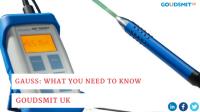 Add My Company
Add My Company
Sign In
Gauss – What You Need to Know
12-04-2018

How did it come about?
Gauss is the cgs unit of measurement of magnetic flux density, which is the amount of the magnetic field in a given area. Gauss gets its name from Johann Carl Friedrich Gauss, a German mathematician who came up with the formula for measuring changes in a magnetic field.
What is it?
Essentially, gauss refers to the strength of the magnetic field or rather, how much magnetic field is in a given area. One unit of gauss is one line of flux in a 1 cm square surface area. Another way to think of it is in terms of flux density.
It is important to note that flux density is not the same as the strength of a magnetic field. However, magnetic flux density is precisely what it sounds like, the number of magnetic field lines in a given area. To be more technical, one gauss can be defined as being one maxwell of magnetic flux in a square centimetre of surface area.
Furthermore, a magnetic field does not have the same magnetic flux density throughout its entire area. As a result, gauss should not be mistaken for a measure of the magnet’s pull strength, mainly since two magnets cannot even be compared this way unless they share the same:
Shape
Dimensions
Measured in the same places
Why Do You Need to Know About the Gauss?
If you are involved in working with or purchasing magnets, you need to at least be aware of the basic principles of gauss. Simply because its use is fundamentally essential in the design, manufacture and handling of magnets.
In the simplest form, and as a rule of thumb, one way of determining the strength of a magnet is by using the gaussian unit measurement as a reference. Gaussian units of measurements help consumers understand the strength of the magnets that they are buying. Examples include:
5 Gauss – Earth’s magnetic field at its surface
100 Gauss – Standard refrigerator magnet
3,700 Gauss – Ferrite magnet
11,000 Gauss – Samarium Cobalt (SmCo) magnet (grade 2:17)
12,500 Gauss – Alnico (AlNiCo) magnet (grade 5)
13,000 Gauss – Neodymium (NdFeB) magnet (grade N42)
Neodymium magnets are the strongest type of permanent magnets available. These magnets can have a gauss rating over 13,000. Moreover, magnets used in the medical industry, particularly in MRI machines, often have a gauss rating between 20,000 and 70,000.
It is important to note that the strength of a magnet can be impacted by its size. While the size of the magnet will not change the gauss rating, the magnetic field that is created will shrink or grow according to the magnets size. Basically, the larger the magnet, the better it will be at attracting items from a greater distance.
Magnets cannot gain strength when combined with other magnets. For example, a magnet with a gauss rating of 600 will still have the same rating if it is attached to an identical magnet. The magnets will not combine to create a magnet with a gauss rating of 1,200. However, the magnetic field will grow in this case.
The Gaussmeter
To measure magnetic field parameters and material magnetic properties, a gaussmeter is the mostly commonly used tool. A Gaussmeter provides several functions, including:
Identifying conformity of the equipment for magnetic particle inspection to the required specifications
Testing the level of induction fields of tested products, components or devices before/during magnetic particle inspection
Examining the level of remanent magnetisation
Assessing the level of industrial interference
Testing the level of magnetic fields
Despite the gaussmeter’s simplicity of design, ease of operation and high metrological characteristics, it’s measurement accuracy is dependent upon the temperature.
Goudsmit UK
At Goudsmit UK, we offer you a wide range of design support. With our years of experience and expertise, we can offer the best solution for your application. Not to forget that we can carry out the manufacture, coating, magnetisation, inspection and shipping of your products to ISO 9001, AS9100 and TS16949 quality standards.
Contact us today at info@goudsmit.co.uk of if you’d rather speak to a member of our team, call us on (0) 2890 271 001.
For more information on our magnetic products visit our magnetic grades webpage or our brochure.
Follow us on LinkedIn, Twitter and Facebook for regular updates.
For more information on Gauss – What You Need to Know talk to Goudsmit Magnetics (UK) Ltd
Enquire Now
List your company on FindTheNeedle.

